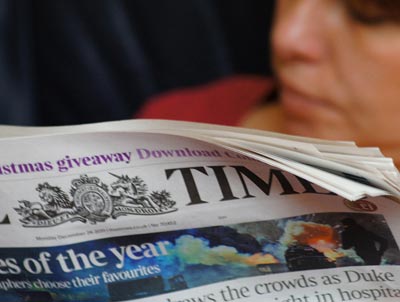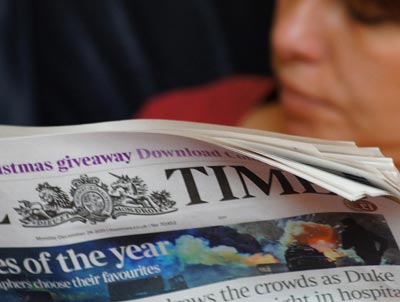
 (Photo: jon smith.)British Chancellor of the Exchequer George Osborne is pushing ahead with the austerity strategy pursued since 2010 by the ruling Coalition of Conservatives and Liberal Democrats.
(Photo: jon smith.)British Chancellor of the Exchequer George Osborne is pushing ahead with the austerity strategy pursued since 2010 by the ruling Coalition of Conservatives and Liberal Democrats.
But fiscal consolidation, especially when applied in a downturn, does not revive an economy, as the sluggish growth of European countries such as Ireland, Greece, Spain and the UK has confirmed over the last few years. In Britain, the economy has performed much worse than projected by the Coalition. In June 2010, just as it assumed power, it was forecast that real GDP would be 7.8% higher in 2012 than in 2009. However, this figure was revised in late 2012 to 2.5%, a shortfall of 4.7%, or about £75 billion. The Coalition’s economic targets keep slipping away. Nevertheless, David Cameron’s government has stubbornly pursued the implementation of austerity policies. As one senior Treasury official put it: “We do have a Plan B: it’s to keep doing Plan A for longer.”
In official declarations, fiscal consolidation is claimed to be the right policy to pull Britain and Europe out of the economic crisis. However, the evidence against this view is so overwhelming that austerity is better seen as a strategy by political and corporate elites for rolling back the welfare state. This benefits the wealthy, but not the rest of the population, and it is therefore to be expected that the public will resist such measures.
The mainstream media play an important public relations role in presenting a positive picture of austerity. A study conducted at University College Dublin, Ireland, examines media coverage of austerity measures since 2010 in four leading British newspapers, namely, the Financial Times, the Times, the Daily Telegraph and the Guardian. The results clearly show the pro-austerity bias in the British press (with the exception of the Guardian). Out of a total of 347 editorials and opinion articles published since 2010, only 21% are opposed to austerity (46% explicitly support it while 33% are neutral). Moreover, if the Guardian, the most progressive newspaper in the sample, is excluded, only 13% of pieces are against austerity. Only 5% of articles in the Daily Telegraph, the most ideologically right-wing paper, oppose austerity, while 14% in the Times and 17% in the Financial Times adopt the same stance.
Another way to appreciate the biased nature of news coverage in the UK is to look at the background of “experts” commenting in the media, most of whom come from elite institutions or share their ideology. Among all contributors to the opinion pieces mentioned above, and excluding regular journalists, 54% are economists or working in the financial sector, 38% are politicians – virtually all from the establishment parties, namely, Conservative, Liberal Democrat and Labour -, 6% are academics (excluding academic economists), and only 1% are from a trade union. It is thus not difficult to understand why media coverage gives prominence to pro-austerity viewpoints. It should not come as a surprise that news content is overwhelmingly favorable to corporate and political elites’ interests.
News organizations’ endorsement of the Coalition’s program was made clear from the start in 2010. The Financial Times editorialized boldly that “There are alternatives to UK austerity, just not good ones” and called the Treasury’s strategy “sensible.” The Daily Telegraph congratulated George Osborne on his first budget, which it deemed to be “clever,” an “excellent start,” “fair and progressive,” and one “of authority and intelligence.” [1]
As the Coalition unveiled its plans in 2010, the Financial Times noted that one problem was that “Britons are unprepared” for fiscal consolidation, as there was “no nervousness” among the British population about the scale of the fiscal deficit. The newspaper predicted that as austerity would deepen over the years, “the pain from these changes will come in several waves” and thus George Osborne “will have to hold his nerve” and keep in mind that “Pushing through the coming squeeze requires smart salesmanship today and Churchillian resolve tomorrow.”
Media coverage of the latest budget conforms to news organizations’ record since 2010. For example, the press described the 2013 budget as “a move in the right direction.” It was even criticized for being “far from radical enough or bold enough,” as more cuts are deemed necessary because the economy allegedly “remains blighted by vastly excessive public spending.” The media want even more cuts, asserting that “We’re paying the price for not cutting harder,” while they “disagree” that Britain should “pump-prime the economy.”
In short, the corporate press circulates the Coalition government’s viewpoint, and it seems that opposition to austerity will have to come from outside mainstream institutions if anything is going to change.
Footnotes
1. “A smart Budget that pulls Britain back from the brink,” Daily Telegraph, 23 June 2010.
Join us in defending the truth before it’s too late
The future of independent journalism is uncertain, and the consequences of losing it are too grave to ignore. To ensure Truthout remains safe, strong, and free, we need to raise $24,000 by the end of today. Every dollar raised goes directly toward the costs of producing news you can trust.
Please give what you can — because by supporting us with a tax-deductible donation, you’re not just preserving a source of news, you’re helping to safeguard what’s left of our democracy.